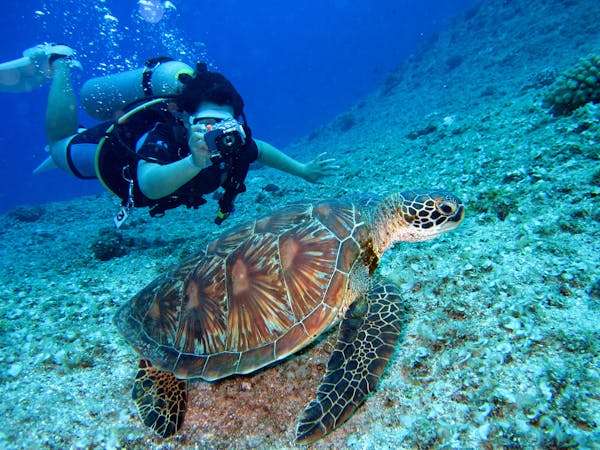In recent years, there has been a growing recognition of the profound impact human activities have on the environment, particularly within sensitive ecosystems like our oceans. This heightened awareness has sparked a global movement towards sustainable practices across various industries, and diving is no exception. Ecotourism and sustainable diving not only offer opportunities for exploration and adventure but also present a unique platform for individuals to engage in conservation efforts beneath the waves. In this comprehensive guide, we will explore seven actionable steps that divers can take to embrace eco-friendly habits and minimize their ecological footprint while immersing themselves in the awe-inspiring beauty of the underwater world.
Choose Responsible Dive Operators
Selecting the right dive operator is the first crucial step towards practicing sustainable diving. Responsible operators go above and beyond to minimize their environmental impact by adhering to strict guidelines and certifications such as Green Fins or PADI Green Star recognition. These certifications serve as a testament to the operator’s commitment to reef protection, waste management, and education on marine conservation. By choosing operators that prioritize sustainability, divers can ensure that their underwater adventures contribute positively to the preservation of fragile marine ecosystems.
Reduce Single-Use Plastics
The prevalence of single-use plastics poses a significant threat to marine life and the health of our oceans. From plastic water bottles to disposable straws, these items often find their way into underwater environments, where they can harm marine species and degrade sensitive habitats. Sustainable divers can make a difference by ditching single-use plastics in favor of reusable alternatives. Investing in durable, eco-friendly dive gear and encouraging fellow divers to adopt plastic-free habits can significantly reduce the amount of plastic waste entering our oceans and help safeguard marine biodiversity for future generations.
Practice Responsible Buoyancy Control
Buoyancy control is not only essential for safe diving but also plays a critical role in protecting fragile marine habitats. Mastering buoyancy allows divers to navigate underwater environments with precision, minimizing the risk of unintentional contact with coral reefs and other delicate ecosystems. By enrolling in buoyancy specialty courses and refining their skills, divers can ensure that they leave minimal impact on the underwater world, allowing marine life to thrive undisturbed.
Respect Marine Life
Respecting marine life is paramount for sustainable diving practices. While it may be tempting to touch or interact with underwater creatures, such actions can disrupt their natural behavior and cause unnecessary stress. Sustainable divers prioritize observing marine life from a respectful distance, avoiding any actions that could harm or disturb aquatic species. By maintaining a safe distance from delicate corals and refraining from collecting souvenirs or feeding marine animals, divers can appreciate the beauty of the underwater world without compromising its integrity.
Dive Responsibly in Sensitive Areas
Certain diving destinations are particularly vulnerable to environmental degradation due to factors such as over-tourism, pollution, or climate change. Sustainable divers must be mindful of their impact when exploring sensitive areas such as coral reefs, marine sanctuaries, or nesting sites for endangered species, especially when enjoying thrilling scuba diving in Punta Cana, for instance. Following designated dive routes, adhering to local regulations, and minimizing disturbance to fragile habitats are essential practices for responsible diving. By exercising caution and respect in these environments, divers can help protect vulnerable ecosystems and contribute to their long-term sustainability.
Support Conservation Initiatives
Active involvement in marine conservation efforts is another crucial aspect of sustainable diving. By participating in reef clean-up dives, volunteering with local organizations, or supporting conservation initiatives, divers can directly contribute to the preservation of marine ecosystems. These efforts not only help mitigate the impacts of human activities on underwater environments but also foster a sense of stewardship and responsibility among divers. Whether it’s contributing to reef restoration projects, engaging in educational programs, or supporting research initiatives, every action taken toward marine conservation makes a meaningful difference.
Educate Yourself and Others
Education is a powerful tool for promoting sustainable diving practices within the diving community and beyond. Divers should stay informed about current environmental issues affecting marine ecosystems and actively seek opportunities to expand their knowledge. By sharing insights, experiences, and best practices with fellow divers, individuals can inspire positive change and foster a culture of environmental awareness and responsibility. Through ongoing education and advocacy, divers can become powerful ambassadors for marine conservation, driving collective action toward a more sustainable and resilient underwater world.
Incorporating eco-friendly principles into diving practices is not just a choice but a responsibility that each diver bears. By following these seven steps for sustainable diving, divers can make a tangible difference in preserving the health and vitality of our oceans. Whatever you do, keep in mind that every action taken toward sustainability contributes to the greater goal of protecting marine ecosystems for future generations. Let’s dive deeper, not just into the ocean’s depths, but into a commitment to sustainable practices that ensure the beauty and biodiversity of our oceans endure for generations to come.

As the editor of the blog, She curate insightful content that sparks curiosity and fosters learning. With a passion for storytelling and a keen eye for detail, she strive to bring diverse perspectives and engaging narratives to readers, ensuring every piece informs, inspires, and enriches.









